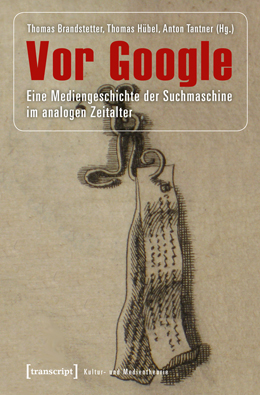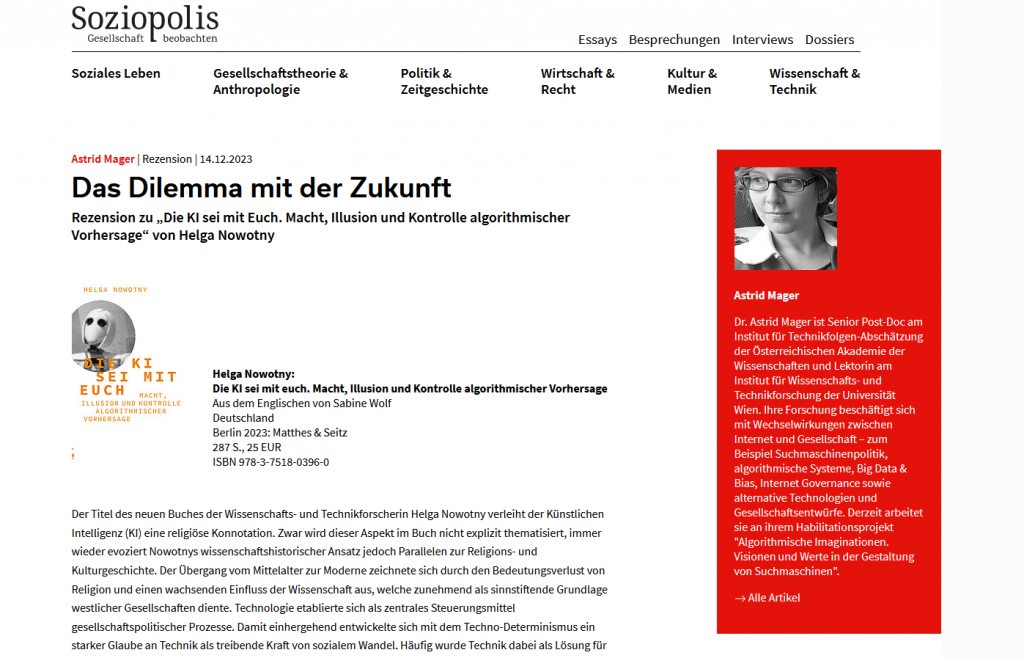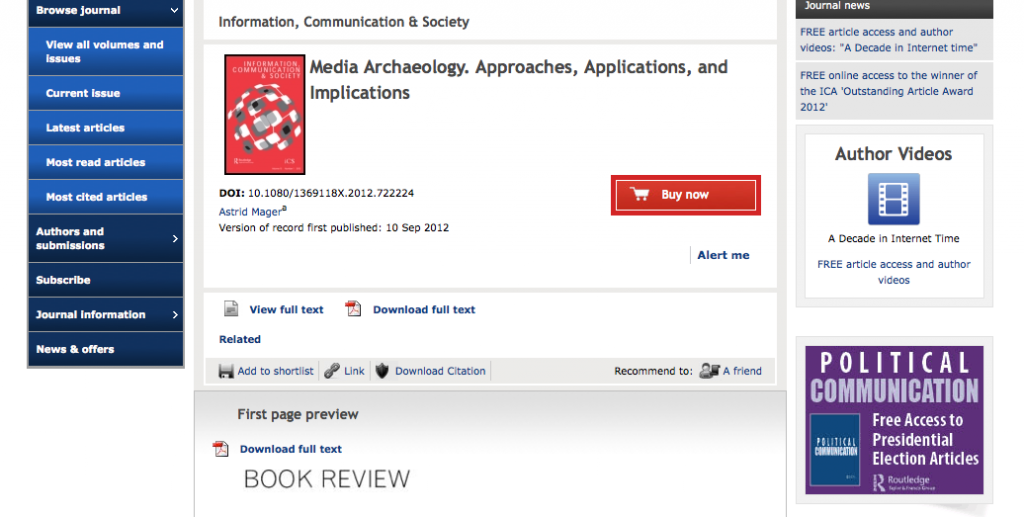Here’s my book review of Helga Nowotny’s book In AI We Trust, which just came out in German – “Die KI sei mit Euch“. Soziopolis asked me to write a review as part of their AI special issue, which I gladly did! It’s titled “Das Dilemma mit der Zukunft” (in German).. enjoy!
Tag Archives: book
vor google
 On the 9th of April the book “Vor Google. Eine Mediengeschichte der Suchmaschine im analogen Zeitalter” will be presented and discussed in the Wienbibliothek im Rathaus (in German). The book is edited by Thomas Brandstetter, Thomas Hübel & Anton Tantner and contains a number of essays on “analogue search engines” including bible citation indexes, state calendars of the 18th century and their hierarchical system, newspaper comptoirs, servants as crucial information centers, Vannevar Bush’s Memex and the politics of bibliometrics.
On the 9th of April the book “Vor Google. Eine Mediengeschichte der Suchmaschine im analogen Zeitalter” will be presented and discussed in the Wienbibliothek im Rathaus (in German). The book is edited by Thomas Brandstetter, Thomas Hübel & Anton Tantner and contains a number of essays on “analogue search engines” including bible citation indexes, state calendars of the 18th century and their hierarchical system, newspaper comptoirs, servants as crucial information centers, Vannevar Bush’s Memex and the politics of bibliometrics.
Since I’ll be giving a short review of the book and participate in the round table discussion (along with Jana Herwig and Stefan Zahlmann) I’m currently reading through the book.
The impression I immediately got while flipping through the pages is that thinking about search engines and their predecessors from a historic angle adds great value to common search engine research. Some of the past issues – e.g. how to organize indexes, the politics of search – still haunt present-day search tools, while others have only recently been introduced – e.g. the commercial dimension of search engines and the exploitation of user data. All in all there’s much to learn from juxtaposing contemporary and past search engines!
If you wanna participate in this exciting endevour please join us on the 9th of April, 7pm, Lesesaal der Wienbibliothek im Rathaus, Eingang Lichtenfelsgasse 2, Stiege 6 (Lift), 1. Stock, 1010 Wien. (= sounds complicated, but will hopefully be doable 😉 )
Here’s the book outline from the Wienbibliothek Website, where you can find more information:
Ein Alltag ohne digitale Suchmaschinen ist heute nur noch schwer vorstellbar. Dabei lassen sich zahlreiche Einrichtungen, Personen und Techniken ausmachen, die lange vor Google und Co ähnliche Funktionen übernommen haben – Staatshandbücher und Diener etwa, aber auch Bibliothekskataloge, Fragebögen oder Zeitungskomptoire. Welche strukturellen Ähnlichkeiten gibt es zwischen diesen früheren und den heutigen Suchmaschinen? Welche Utopien knüpften sich an die Suchmaschinen des analogen Zeitalters? Welche Formen von Kontrolle ermöglichten sie? Das vorgestellte Buch widmet sich diesen und weiteren Fragen und liefert damit nicht nur neue Erkenntnisse über die Medien der Vergangenheit, sondern vertieft auch die Analysen der gegenwärtigen medialen Lage.
book review online
My book review “Media Archaeology. Approaches, Applications, and Implications” (eds. Erkki Huhtamo and Jussi Parikka) has been published by the journal Information, Communication & Society (see below). Thanks to David Beer for the really quick publication process! It was fun!
Publish or perish?
The new level in this game of academia – the postdoc level – seems to include making a decision on getting the PhD published as a book or not. Encouraged by one of my PhD reviewers, Michael Nentwich, I started to contact publishing houses to get information about the procedure of transforming PhDs into books. Well, the first answer I got was pretty disappointing. One of the central points in the publishing guidelines was to consider whether I would like to spend another 12 months, minimum, up to 5 years on reworking my thesis. And whether I have got a contract that allows me to do so. Well, the quick answer to all that is no. No, I don’t want to rework my thesis for the next couple of years and no, I don’t have a contract that gives me time to do so (is there any contract despite tenure track positions – pretty rare in Europe up to non-existent in Austria – that allow you to do so?). Further, my empirical research conducted in Austria turned out to be too specific for the US market according to one publisher – although “it looks like an interesting piece of research”.. hm, local contexts don’t seem to be appreciated much in globalized academia. Since I wasn’t sure whether to go down this road anyway, I take it as an interesting experience having figured that out. Also, my heart beats for open access and thus an online publication may not be bad either. However, my own experiences made me talk to other people, also from the HUMlab, about this issue and it seems as if there are no standardized solutions to this problem. Rather, each local academic culture seems to have a different approach. While some people from the British context are convinced that it’s not worth the trouble and therefore better go for peer-reviewed journal publications, people from the US tend to go for a book publication straightforwardly. And of course, disciplines matter as well. So much for the globalized academic landscape. An interesting contribution in the digital arts context comes from Charlotte Frost, who has just set up the platform PhD2Published with helpful tips etc. Check it out here.
Besides these burning questions, I was exploring the surroundings of Umeå the last couple of days.. well, surroundings, this lake is approx. 5 min from my appartment – can you believe it?



![IMG_0209[1]](https://www.astridmager.net/wp-content/uploads/2010/09/IMG_02091-300x225.jpg)
![IMG_0169[1]](https://www.astridmager.net/wp-content/uploads/2010/09/IMG_01691-300x225.jpg)
![IMG_0204[1]](https://www.astridmager.net/wp-content/uploads/2010/09/IMG_02041-300x225.jpg)
![IMG_0222[1]](https://www.astridmager.net/wp-content/uploads/2010/09/IMG_02221-300x225.jpg)